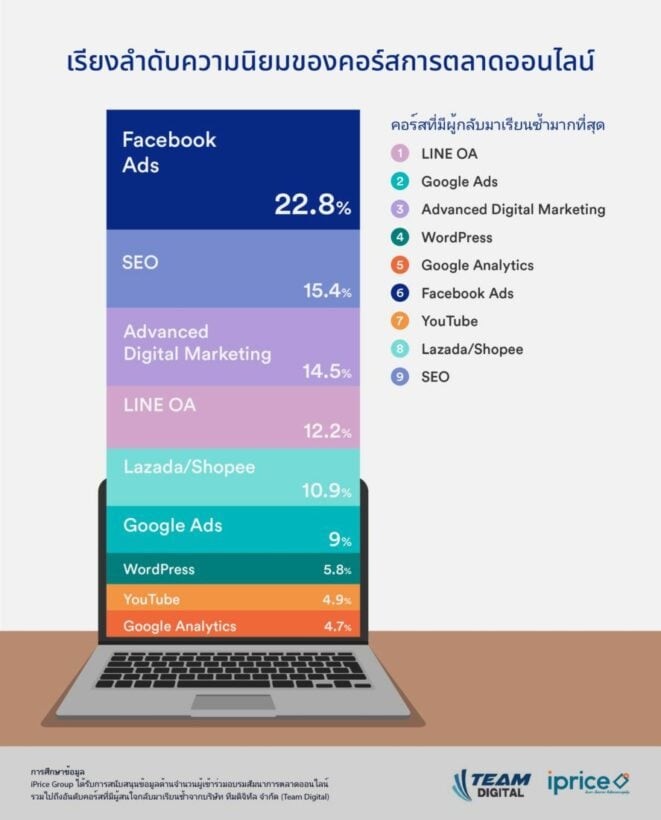Exploring the digital marketing landscape in Thailand: Trends and insights

The world has become a global village, such that business people no longer have to limit themselves to serving the needs of the people close to them. This approach has especially taken over in Thailand, where business people previously relied on traditional marketing. They have since learned that by digitising a business, they not only make their products more accessible but also simplify their business operations. And with local companies offering practical approaches to digital การตลาด, more business people have taken their businesses to the digital realm. But when operating in such a dynamic space, it’s always important to know what’s changing and how you can use it to your advantage. We look at the top trends and insights in digital marketing in Thailand.
What Trends and Insights Are Shaping Digital Marketing in Thailand?
The business world is ever-changing, and companies that fail to adapt their products and strategies to meet these changes often lose out on opportunities. So, what trends and insights are organisations in Thailand using to stand out?

Integrating Online and Offline Marketing Strategies.
Many businesses in Thailand operate physical and online stores. As a result, they attract a broad audience which goes through varying customer decision journeys and has different expectations. A business must figure out how to streamline its marketing efforts in the following ways:
- Consistency in all channels. A business must use the same brand imaging and messaging on all its channels, be it a website, social media page, or brochures. This consistency inspires trust and loyalty in its customers, who know that they will have a good experience in either case.
- Refining the customer decision journeys. A customer buying an item from a website will go through a different process compared to one buying the same item from a newspaper ad or a magazine catalogue. A business must test its customer decision journeys and analyze the customer interactions and feedback to know what works so it can invest more in the right channels.
Even businesses that are wholly online must use these strategies to ensure that their marketing efforts are similar across their various online channels.
Launching Mobile-Enhanced Apps and Web Pages.
By the last quarter of 2023, statistics showed that 95% of the people living in Thailand owned phones. What’s more, recent statistics show that the average person in Thailand spends about five hours on their phone, which is more than the global average of about four hours. And with internet access becoming more affordable and even free in some cases, phone usage will only increase.
Businesses are already capitalising on this in the following ways:
- Website optimisation. Unlike past websites that focused on the desktop experience, website developers are opting for faster and lighter pages that allow customers to go through the sales funnels in just minutes.
- App access. Businesses that offer everyday services and products are now launching apps that allow people to access their products at the tap of a button and afford the business additional sources of revenue, such as ads.
Another way to optimise your digital marketing strategies for phone users is to integrate messaging apps into your website so that people can reach you via chat rather than calling a number or filling out a contact form.

Personalised Marketing
With more businesses going online, customers have so many options to choose from that customer attraction and retention has become quite difficult. Businesses are navigating this by integrating artificial intelligence and machine learning in their marketing, as follows:
- Personalised recommendations. In the past, a return customer would log into a website or app and see all kinds of products. For example, if they are shopping for groceries, they would need to type in every item until they complete their list. But now, businesses are using machine learning in their sites. As such, this technology keeps records of customer preferences and recommends things to them based on their preferences and budget. What’s more, it can save previously purchased items in a list that the customer can review as they tick what they want to add to their order, which saves them time.
- Tailored marketing. Remember when businesses would send the same ad to everyone? Well, this was often a waste of time and money on the part of the business. After all, many people who would see the ad had no intention of buying the said item. Now, businesses can use AI to not only create buyer personas but also deliver tailored ads to their target audience. This way, people get ads that relate to their interests, which increases the likelihood that they will purchase the item, which drives up business engagement and profits.
This personalisation also makes customers feel heard and seen, which is important in this age where people have options and will always choose the businesses that treat them the best.

Partnering With Social Media Influencers
With over 57 million people using social media in Thailand, the social media audience has been growing quite fast. Most of these people follow influencers who are known for covering topics such as fashion, fitness, beauty, and lifestyle. Their audiences form such strong parasocial relationships with them that they trust them when making purchasing decisions. Businesses have been positioning themselves to work with these influencers as it helps them reach a bigger market and grow a sizeable audience online.
Latest Thailand News
Follow The Thaiger on Google News:


























